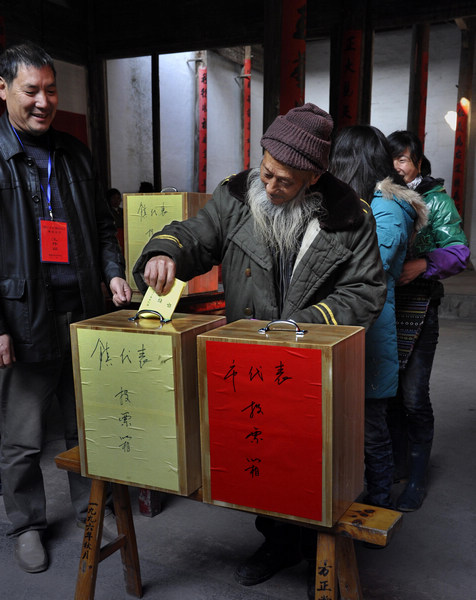More farmers for next NPC
Updated: 2012-03-09 07:53
(China Daily)
|
||||||||
Nearly 3,000 deputies to the 12th National People's Congress will be elected by January 2013 with more seats given to workers and farmers, according to a draft decision by China's top legislature.
The draft was submitted to the annual legislative session on Thursday.
 |
|
Fang Baozhong, 75, votes in the election for deputies to the local people's congress in Shangwufang village, Jiande city, Zhejiang province, last December. [Cai Rongzhang / for China Daily] |
Explaining the draft decision, Li Jianguo, vice-chairman of the 11th NPC Standing Committee, said that a "broad representation among deputies is not only the essential requirement of the system of people's congresses, but also the embodiment of socialist democracy".
Of the number of deputies to the 12th NPC, the proportion at the primary level will increase, especially from among frontline workers, farmers and technicians, Li said.
There also will be a significant increase in the number of deputies from among migrant workers and a drop in the number of deputies who are Communist Party or government officials.
The 11th NPC will end its term in March 2013 and new NPC deputies must be elected by that time.
The draft decision also stipulates that the proportion of women deputies shall be greater than in the last NPC, but Li said "the greatest feature of the election" was that the congress reflected the same population ratio between urban and rural areas.
|
||||
Han Dayuan, dean of the law school at Renmin University of China, said that a broad representation of lawmakers from various backgrounds would help balance the views of different groups and reach consensus. It will make decision-making more democratic.
In January 2008, Hu Xiaoyan, working in Foshan city in Guangdong province, became the country's first migrant worker to be elected a national lawmaker.
"The most important reason for my being elected is so that migrant workers will be given much greater attention," Hu said.
Since 2008, Hu has submitted nearly 20 proposals to the top legislature. All are related to safeguarding the interests of migrant workers, such as providing greater access to education for their children and ensuring workers get paid on time.
There are three migrant workers who are deputies in the 11th NPC, but the number of migrant workers in the country has expanded rapidly in recent years. At around 250 million, they are a major force in China's economic development.

 Relief reaches isolated village
Relief reaches isolated village
 Rainfall poses new threats to quake-hit region
Rainfall poses new threats to quake-hit region
 Funerals begin for Boston bombing victims
Funerals begin for Boston bombing victims
 Quake takeaway from China's Air Force
Quake takeaway from China's Air Force
 Obama celebrates young inventors at science fair
Obama celebrates young inventors at science fair
 Earth Day marked around the world
Earth Day marked around the world
 Volunteer team helping students find sense of normalcy
Volunteer team helping students find sense of normalcy
 Ethnic groups quick to join rescue efforts
Ethnic groups quick to join rescue efforts
Most Viewed
Editor's Picks

|

|

|

|

|

|
Today's Top News
Health new priority for quake zone
Xi meets US top military officer
Japan's boats driven out of Diaoyu
China mulls online shopping legislation
Bird flu death toll rises to 22
Putin appoints new ambassador to China
Japanese ships blocked from Diaoyu Islands
Inspired by Guan, more Chinese pick up golf
US Weekly

|

|








